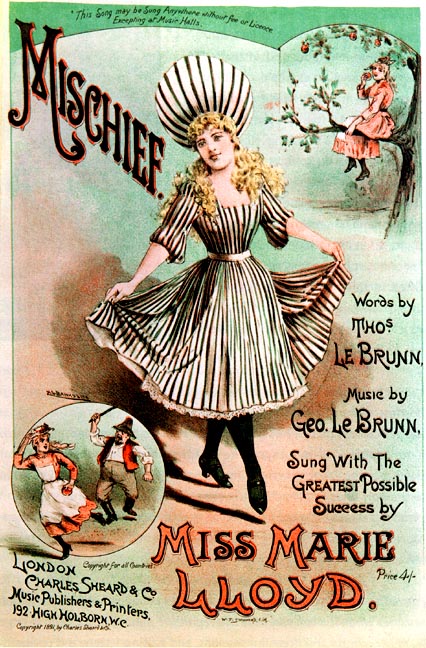[The decorated initial appears in the original text of this essay, which appeared in More. George P. Landow scanned and formatted the text, adding links to material on this site.]
O Love! When you 're in love—
Love makes a man.
Feel awf'lly peculiar.
O Love! When you're in love—
With a Jane or a Julia,
Man falls in. love!
 HESE words, and their music,
not less exquisite. I owe to the
erudition of a certain painter,
who seems to have spent most
of the evenings of his life in
Music Halls and can bring forth from the
storehouse of his memory many fatuous, forgotten choruses. Through the old "Oxford"
these words resounded from the great throat
of George Leyburne, nightly, years ago. Now
they are not remembered. They buzz no longer in brains that are fulfilled with later melodies; and save, haply, in a far country, by an
old farmer, whose quiet life has not expunged
the memory of his visit to the town, you do
nowhere hear them carolled. I am glad to
resuscitate their rhythm: bugle-notes to wake
sleeping memories in some breasts; more melancholy for me, fainter, than scent of soever
long-kept lavender.
They belong to the unregenerate period of
the Music Halls. In sense and sentiment and
syntax, they differ vastly from anything that
one hears now. Yet, in their day, they were
vastly popular, were typical, indeed, of all
the songs in the old "Oxford" or the "Albert"
or the "Hoxton Palace of Varities." To
that sea of billicocks, the audience, through
that fog of cheap tobacco-smoke, with the
glare of footlights cast up on to his crumpled
shirt-front and making a dark cavern of his
mouth, the Lion Comique bawled out always
some such crude, conventional ditty. And,
when his turn was done, and he had swaggered
off that stage whose back-cloth was ever a green
glade with a portico or two of white marble,
on tripped his sister-artist, the badly-rouged
Serio, gaudy in satinette, energetic, hoarse,
and without any talent. Young or old she
might be, gracious or uncomely, might trip
off, at last, non sine pastoricia fistula [pastoral not without a pipe] or in a
storm of approval—what matter? She was
ever the same Serio. The convention was
never broken.
HESE words, and their music,
not less exquisite. I owe to the
erudition of a certain painter,
who seems to have spent most
of the evenings of his life in
Music Halls and can bring forth from the
storehouse of his memory many fatuous, forgotten choruses. Through the old "Oxford"
these words resounded from the great throat
of George Leyburne, nightly, years ago. Now
they are not remembered. They buzz no longer in brains that are fulfilled with later melodies; and save, haply, in a far country, by an
old farmer, whose quiet life has not expunged
the memory of his visit to the town, you do
nowhere hear them carolled. I am glad to
resuscitate their rhythm: bugle-notes to wake
sleeping memories in some breasts; more melancholy for me, fainter, than scent of soever
long-kept lavender.
They belong to the unregenerate period of
the Music Halls. In sense and sentiment and
syntax, they differ vastly from anything that
one hears now. Yet, in their day, they were
vastly popular, were typical, indeed, of all
the songs in the old "Oxford" or the "Albert"
or the "Hoxton Palace of Varities." To
that sea of billicocks, the audience, through
that fog of cheap tobacco-smoke, with the
glare of footlights cast up on to his crumpled
shirt-front and making a dark cavern of his
mouth, the Lion Comique bawled out always
some such crude, conventional ditty. And,
when his turn was done, and he had swaggered
off that stage whose back-cloth was ever a green
glade with a portico or two of white marble,
on tripped his sister-artist, the badly-rouged
Serio, gaudy in satinette, energetic, hoarse,
and without any talent. Young or old she
might be, gracious or uncomely, might trip
off, at last, non sine pastoricia fistula [pastoral not without a pipe] or in a
storm of approval—what matter? She was
ever the same Serio. The convention was
never broken.
Well! I know these things only by tradition. If I fare to the Transpontine Halls, I find but an embarrassed remnant of the old performers, striving to live up to the imitations of Chevalier and Marie Lloyd. Reason, variety, refinement have crept gradually in, till one shall sigh in vain for the fatuous and delightful days of
Oh the Fairies! Oh the Fairies!
They are so tender,
The feminine gender!
Oh the Fairies! Oh the Fairies!
Oh for the wings of a Fairy Queen!
But one must not marvel that those days are over. With sumptuous palaces erected in the heart of London, and with the patronage of fashion, new modes were bound to come in, sooner or later. The homely humour of James Fawn and Bessie Belwood was superseded, ere long, by Chevalier, with his new and romantic method; by Cus Elen, with his realistic psychology and his admirably written songs; by Marie Lloyd, with her swift nuances.


Two Images of Marie Lloyd,. [Click on the thumbnails for larger images.]
Meanwhile—a new art! Every one was interested. Every one had seen Mr. Sickert's paintings. Soon other painters began to frequent the Halls. Mr. Arthur Symons cut in, and secured the Laureateship. Mr. Anstey wrote satires. Mr. Frederic Wedmore began to join in the choruses with genteel gusto. And now, when, forwearied with the demands of an intellectual life, I stray into the Tivoli, and would fain soothe my nerves with folly, I find an entertainment that is not only worthy of attention, but is even most exigent of all my æsthetic faculties. There is a swift succession of strongly, variously defined personalities, all trained and talented and self-conscious; all in pretty or appropriately grotesque costumes; all imitating this or that phase of modern life within the limits of their new art. The words of their songs are quite pregnant with character and wit. The music to which they are set is no longer the eternal variation on one or two themes, but is often novel and always adapted to the words' meaning. When fatuousness and vulgarity take their turns, themselves are in ihe nature of a surprise, startling, not soothing. I find no repose for my faculties in the Tivoli. The atmosphere from the stage of it is surcharged willi artistic conscience. One knows that every performer is, in private life, a charming and serious person, whose photograph is reproduced in the illustrated papers, from time to time, with a description of his domestic life and his valuable collection of proof-engravings, press-cuttings, and what not. The interviewers have told one that he has a grand piano in his drawing-room and often composes his own songs, and "will sing no words that he could not individually express." And one compares him, as he stands there, with that humble creature who sang, with very great success, years ago,
Then say was he a coward?
Had he a coward's heart?
By acting in this manner, did
He play the coward's part?
It was his earnest wish
One day nobly to behave—
And he proved himself at last to be
The Bravest of the Brave.
Does one, as I do, wish only for relaxation in Music Halls, he must needs go to Paris, There the Music Halls have been always kept in their proper perspective. Yvette Guilbert is but an accident. She was never du Café Chantant, and I hope she will soon retire to tile legitimate stage. It is creditable to the Parisians that, depite her talent and individuality, she never found an imitatress. She was, indeed, the one jarring note in the Ambassadeurs, where, in a pale-green avenue, brilliant with white lights one sought the restfulness of a fatuous convention; sought to be lulled by the eternal fat men, telling of La Patrie or of their amouretts, and by the voiceless, sprightly baggages, who sing eulogies of Les Militaires. Part of their charm for me is that, unless I listen, I know not what they are saying in their alien tongue. But they caper and gesticulate gracefully, and the light, familiar music soothes me. I have often thought that a man might end his days very pleasantly in the claque.
Between the French and the old English convention there are several points of difference, but each is based upon a monotonous vulgarity. Perhaps some person, who understands the charm of monotony, will say that in time our Music Halls will reach a plane of monotonous refinement, and that all will then be well. All would then be better, doubtless. But we have already the Italian Opera, and we have the Albert Hall. I insist that vulgarity is an implicit element of the true Music Hall. Why should we have sought to eliminate it? Out of the vulgarity of the people did the Music Hall arise, nor will any one be so foolish as to contend that, by tampering with its foundations, we shall go one step towards refining the people. In its early stage, the Music Hall was a very curious and interesting phenomenon, a popular art. What better outlet for the people's vulgarity? For cultured persons, what better [] of that laughing and contemptuous spirit, which Aristotle knew to be a danger? Vulgarity will, of course, last till the next Glacial Epoch, and we shall always be able to contemplate it. But we were fools to drive it from its most convenient haunt. Oh, for the wasted glories of the old Oxford! Oh, for one hour in the Hoxton Palace of Varieties! I must be glad that a few fragments have been snatched for me from their irrepleviable duties. And, for my part, I do rejoice, in Summer and in Spring, in Autumn and in Winter, this sweet refrain to sing:
He's a de-ar old pal of mine,
Be helped me when I was down,
Lent me his aid,
Willingly,
With a smile, not a frown.
And if the day should come,
And my lucky star should shine,
I shall always be
Most happy to say
"He's a de-ar old pal of mine!"
Related Material: Recordings Music Hall Songs
- H. Clifton (arranged by J. Candy), “Pretty Polly Perkins of Paddington Green” (1863)
- George Ridley (attributed), “Cushie Butterfield” (1864) — a parody of “Pretty Polly Perkins”
- G. W. Hunt, "MacDermott's War Song" (1877)
- Albert Chevalier, "My Old Dutch: A Cockney Song"
- Edgar Bateman and George Le Brunn, "If It Wasn't for the 'Ouses in Between"
- George Leybourne and Alfred Lee, "Champagne Charlie" (1867)
Bibliography
Beerbohm, Max. “The Blight on the Music Halls.” More (1899). New York: Dodd, Mead, and Company, 1922. 129-36.
Last modified 6 December 2011